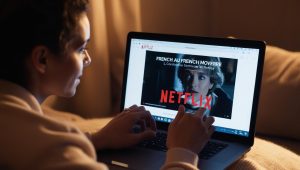Why Retreading French Films Benefits Those Learning Languages?
Imagine yourself lying on the couch, remote in hand, ready for fourth viewing of a French film. Again, maybe you groan at the prospect. You are not wasting your time; so, relax. If you really want to learn French, leaning toward repetition is a secret weapon right out in front of you. If you haven’t already, start looking for films for learning french and watch the magic happen.

Especially in the tumult of language learning, repetition is the glue that transforms ephemeral moments of “je ne sais quoi” into firm knowledge. See your brain as a field. The first time you see a movie is walking across uneven ground; you catch a few words but miss hundreds more. But every rewatch seeds and applies fertilizer. Third, fourth, or even tenth viewing brings the dialogue, intonation, and cultural quirks to life. You remember a tenacious French idiom dropping anchor. At last the difficult nasal “un” sound clicks. Your mind gets more opportunity to absorb, reinforce, and finally solidify new language and grammar by running over the same aural and visual cues.
It goes beyond mere anecdotal evidence. Learners who reviewed foreign language information spaced out over time—through activities like re-watching—had higher long-term memory than those who binge-studied and moved on, according a study reported in the journal Applied Cognitive Psychology. The science is on your side.
The Value of Familiarity Above Perfection
Taking Center Stage Once more (and once more) The first time you click play, you could catch the broad strokes: someone’s lost, someone’s in love, that small town in the Alps seems frigid. Still, catching every phrase is important. Not most likely. And that is more than just OK.
Scenes in the same movie that were all background noise tend to sharpen as you go back into it. Small jokes find their place now. Lines you considered as mumbling turn out as witticisms. For the language learner especially, familiarity promotes comfort rather than contempt.
Also quite amazing is muscle memory. With every repetition, your mouth picks up contour for the unusual sounds. By the eighth repeat, you could find yourself repeating lines as if you were born in Bordeaux. Chunk of dialogue settles inside your brain, ready to burst forth in actual interactions.
Choose a different element to highlight every time. Perhaps simply the performers’ accents. Perhaps merely the words from the bakers. Maybe also how people show delight or uncertainty. These little targets keep rewatches current.
Good Note-Taking: Transposing Observation Into Active Learning
Don’t Copy— Capture
Hold that pen if you find note-taking while viewing French films to be about scribbling every new word. Taking notes should help you, not turn into a task. Ask yourself—what is remarkable, perplexing, beautiful? List that down.

Writing down every foreign word helps one rapidly turn fun movie-watching into a drudgery. Rather, pay close attention to idioms, sentence construction, and statements that keep coming up. The gold dust of actual French living is this.
When a maître d’ employs “Je vous en prie!” three times in twenty minutes, for example, you have just come upon a flexible phrase calling to be part of your own speaking repertoire. Alternatively someone says, “Ça ne vaut pas un clou!” ( “It’s not worth a nail!” ) and you find it difficult to clear from your brain. Remember these lines, together with a brief translation and an example. Sometimes locking that sentence into your brain is achieved by creating a ridiculous doodle next to it.
Enough is three to five new bits every session. Less is usually more. These doable bits are more likely to stick, particularly if you see them again over numerous movies.
Organize Your Notes For Replay:
A chaotic study environment results from scattered post-its and crumpled napkins. Try flashcard or Notion in a dedicated notebook, a Google Doc, or even apps like Anki. Group words by circumstance—greetings, conflicts, shopping, romance—such that they are simple to review and use.
Using a color-coding system, some students mark verbs with red, adjectives with blue, idioms with green. Whatever appeals to you. The aim is to assemble an increasing wealth of practical, real-world French tailored to your level and interests.
Listening Comprehension: You Understand More The more you listen
The language really comes alive when one listens to native French speakers; “textbook French” softens and melts into the cadence of daily living. No grammar book can match the feast of tone, slang, and pace that movies and series provide. And yet, actual French is far faster, sloppier, and immensely more amusing than classroom CDs would have you believe.
Studies from the University of Edinburgh show that repeated “deep listening” improves parsing ability—that is, the ability to recognize word boundaries in fast speech. Hearing “il est là” is different from confusing it for one large sound blob. Repetition lets your ear segment, adapt, and identify words even at slow speed.
Hearing different dialects and natural conversation can help you to become at ease with language quirks—from the Parisian drawl to the singsong lilt of Marseilles. You find how laughter breaks up sentences among friends or how words slum together in furious disputes. Every time you repeat these idiosyncrasies get less frightening.
Turning Passive Observation Into Dynamic Practice
Stop and shadow; almost in time with the performers, you are repeating what you hear. Sort of like karaoke but without music (or fear of criticism). Stop after a sentence or section as you watch to try to match the performers’ rhythm and tone. At first, it’s embarrassing—feels like talking to yourself. For conversational flow and pronunciation, nonetheless, it is quite successful.

Long or tough lines can also be broken down using this approach. Should you trip, rewind, pay close attention, and then repeat. Those complex statements eventually become second nature.
Drawing on Culture: More Than Just Words
French films are windows into values, comedy, history, and daily life rather than only teaching language. Watching “Amélie” lets you really experience Parisian eccentricities. “Intouchables” forces you into sharp social banter and lingo. Regional movies highlight accents and idioms from Provence to Brittany.
Sometimes your notes should also reflect this. Jot down the difference if a character says “Salut, ça roule” to a neighbor and you grew up knowing “Bonjour, comment ça va?” In this sense, you are developing linguistic instincts not available from textbooks.
